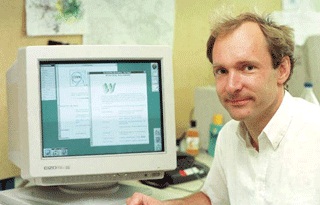Uni of Herts: More To Come From 25 Year-Old Web
12 March 2014, 11:42 | Updated: 12 March 2014, 12:54
The World Wide Web is 25 years-old today - and was created by Sir Tim Berners-Lee - but - it nearly didn't happen.
Whilst working at the CERN lab in Switzerland, Berners-Lee was working on a way to easily access computer files from one another.
But when he presented his ideas to his peers on this day in 1989 it was so ground-breaking, so unexpected by everyone else it was quickly being dismissed by much of the computer and scientific industry.
HISTORY
The ARPANET - the US military began studying the idea of linking computers on networks back in the 1950s and by 1969 had created a stable early version of the internet called "Arpanet". This was purely for military information systems, and only for the US military at that.
By the mid to late 1980s, rival systems to the Web were being proposed, America's "CompuServe" and "Gopher" and from France "Minitel". Crucially, both involved the user having to pay to use it. Berners-Lee's "web", would be free to use.
Sir Tim went on to write the the HyperText Transfer Protocol (HTTP), HyperText Markup Language (HTML), and the first ever web browser, WorldWideWeb.

(picture: CERN)
Ironically, it was the US vice president Al Gore who pushed the Web overcome the rival paid-for systems by getting the US Goverment to use the web - a massive push was the introduction of Whitehouse.gov.
The first widely-public use of WWW was in 1993.
But now in 2014, around 60% of the world's population is still not connected - the use of smartphones in the developing world is set to change that rapidly.
Speaking to Phys.Org, Marc Weber, creator and curator of the Internet history program at the Computer History Museum in Silicon Valley said: "The Web is really only half built; it is not worldwide yet."
A big battle for the shape of the Web could be the effect of billions more people getting online with smartphones in developing parts of the world.
From various sources inc. Phys.Org, Webfoundation and w3.org; here's a timeline of the development of the Web:
- 1945: Vannevar Bush proposes a photo-electrical-mechanical device called a Memex, to make and follow links between documents on microfiche
- 1950s: US military starts remotely linking computers
- 1969: US military creates Arpanet
- March 12, 1989: British computer scientist Tim Berners-Lee circulates his "informational management proposal" at the European organization CERN, laying the foundation for the World Wide Web.
- 1990: Sir Tim's creation dubbed "The Mesh" is re-named "The Web"
- 1991: The www browser is released
- 1993: Mosaic, the first real browser interface, is developed by a team from the University of Illinois
- 1993: The White House launches its website, www.whitehouse.gov
- 1993: Launches include "David and Jerry's Guide to the World Wide Web," the forerunner to Yahoo, and Amazon.com
- 1995: Microsoft releases Internet Explorer
- 1995: eBay is launched
- 1996: Finland's Nokia launches first mobile phone with Internet connectivity
- 1998: Google begins operations, quickly growing into the leading search engine
- 1998: The US government hands over control of the Web domain system to the Internet Corporation for Assigned Names and Numbers, a private entity
- 2001: The music swapping Napster is ordered shuttered by the US courts in a key ruling on online copyrights
- 2005: The number of people connected to the Internet tops one billion
- 2007: Estonia conducts the first online parliamentary election
- 2011: Radioplayer created to allow listeners to tune to stations like Heart via their computer and smartphones
- 2012: Online commerce for 2012 tops $1 trillion
- 2012: The social network Facebook reaches one billion members
- 2013: Some 2.7 billion people worldwide are connected to the Internet, around 40 percent of the world's population
- 2013: Chinese overtakes English as the dominant language
THE FUTURE
Dr. Jyoti Choudrie, reader of Information Systems at the University of Hertfordshire told Heart: "What we experience now with the web is not how it will be in the future, there is so much more to come.
It's not just about the speed of accessing the web. There is a lot more to be discovered, this is NOT the end of things. Wearable technology like Google Glasses, Smart Watches - all these are showing us new potentials for technology (to use the web), it's very exciting."
CRIME
As well as the force for good - inevitably with any new invention, there will always be the possibility for crime. Along with using the web for criminals to share information and increasing levels of cyber-bullying, society is grappling with how to deal with these issues.
Today (March 12), the think-tank Parliament Street has released data provided by 25 police forces in England and Wales relating to reported crimes "which in some way relate to Twitter and Facebook." The figures for Herts, Northants and Thames Valley forces are included below:
Relating to Facebook in 2011, 2012, 2013
Hertfordshire 361; 670; 759
Northants 318; 386; 468
Thames Valley 616; 351; 304
Relating to Twitter in 2011, 2012, 2013
Hertfordshire 29; 77; 137
Northants 0; 19; 21
Thames Valley 6; 11; 25


